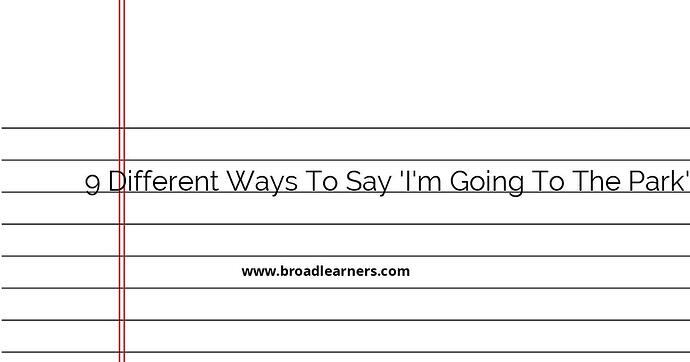When expressing your plans to visit the park in English, there are a variety of ways to phrase it. Here are nine alternative ways to convey the same message:
- I'm heading to the park
- I'm off to the park
- I'm going to the park
- I'm taking a trip to the park
- I'm planning to go to the park
- I'm going to visit the park
- I'm going to spend time at the park
- I'm going to enjoy the park
- I'm going to relax at the park
Each of these phrases conveys the same message in a slightly different way, allowing you to choose one that best suits the tone or context of your conversation.
1. I'm Heading to the Park
Saying, 'I'm heading to the park,' is a casual and straightforward way to inform someone that you are going to the park. This phrase is commonly used in everyday conversations to indicate your upcoming activity.
Example:
Friend: What are your plans for this afternoon?
You: I'm heading to the park to meet a friend.
2. I'm Off to the Park
'I'm off to the park' carries a sense of departure or setting out for a specific destination, in this case, the park. It conveys a sense of movement and readiness to go on your park visit.
Example:
Parent: Where are you going with that picnic basket?
You: I'm off to the park for a picnic.
3. I'm Taking a Trip to the Park
'I'm taking a trip to the park' adds a bit of formality to your statement. It implies a planned outing or excursion to the park, suggesting a deliberate decision to visit this particular location.
Example:
You: I'm taking a trip to the park to enjoy the beautiful weather.
4. I'm Planning to Go to the Park
Indicating that 'I'm planning to go to the park' suggests some forethought and intention behind your park visit. It communicates that this activity is part of your current agenda or schedule.
Example:
Colleague: What are your weekend plans?
You: I'm planning to go to the park and read a book.
5. I'm Going to Visit the Park
'I'm going to visit the park' emphasizes the act of visiting or seeing the park, perhaps implying that this is not just a location but an experience you are looking forward to.
Example:
Visitor: What's the best spot in town?
You: I'm going to visit the park; it's a peaceful oasis in the city.
6. I'm Going to Spend Time at the Park
When you say, 'I'm going to spend time at the park,' you are highlighting your intention to allocate a specific period at the park for relaxation, activities, or simply being outdoors.
Example:
Friend: How do you plan to unwind this weekend?
You: I'm going to spend time at the park, just enjoying the fresh air.
7. I'm Going to Enjoy the Park
Saying, 'I'm going to enjoy the park,' conveys your anticipation of deriving pleasure, fun, or a positive experience from your visit to the park. It reflects a positive attitude towards the upcoming activity.
Example:
Parent: Have fun outdoors today!
You: I'm going to enjoy the park with some games and a picnic.
8. I'm Going to Relax at the Park
'I'm going to relax at the park' suggests that your primary goal at the park is to unwind, destress, or rejuvenate. It implies that you see the park as a place of tranquility and calmness.
Example:
Doctor: Remember to take breaks and relax this week.
You: I'm going to relax at the park; it always helps me clear my mind.
9. Conclusion
By using any of these alternative phrases, you can effectively communicate your plan to visit the park while adding variety and nuance to your speech. Consider the context and your audience when choosing the most suitable expression for your message.
Did I miss anything? Respond below
